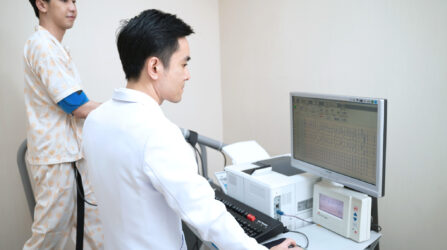Enlarged hearts can be classified into two major types: those caused by thickening of the heart muscle due to the heart working hard or being under strain, often associated with high blood pressure or valve abnormalities, and those caused by poor relaxation of the heart muscle, leading to blood pooling in the heart chambers.
For further information or Booking..
Types of Enlarged Heart
-
Due to Thickened Heart Muscles
Like bodybuilders who develop larger muscles through intense effort, heart muscles can also thicken when the heart works harder—such as in cases of high blood pressure or heart valve disorders—resulting in an enlarged heart. -
Due to Poor Contraction
In this type, the heart muscle weakens and cannot pump efficiently, causing blood to accumulate in the chambers—similar to overfilling a balloon—leading to heart enlargement.
Other Causes
Other causes of an enlarged heart include high blood pressure, heart valve disorders, coronary artery disease, diabetes, idiopathic cardiomyopathy, alcohol abuse, and more.
Symptoms of an Enlarged Heart
Many individuals may not exhibit symptoms if the heart continues to function normally. However, as the heart’s function declines, symptoms may include:
-
Shortness of breath and fatigue
-
Rapid or irregular heartbeat
-
Dizziness or lightheadedness
-
Chest discomfort or palpitations
-
Swelling in the ankles or legs
-
Persistent cough, especially when lying down
-
Difficulty lying flat due to chest congestion
Causes of an Enlarged Heart
-
High Blood Pressure – Forces the heart to work harder, causing it to enlarge
-
Heart Valve Disease – Dysfunctional valves strain the heart
-
Cardiomyopathy – Disease of the heart muscle, including damage from alcohol
-
Congenital Heart Defects – Such as holes in the heart wall
-
Arrhythmias – Abnormal heart rhythms
-
Pulmonary Hypertension – Elevated blood pressure in the lungs
-
Chronic or Severe Anemia
-
Thyroid Disorders
-
Hemochromatosis – Excess iron in the body
-
Amyloidosis – Protein deposits in the heart muscle
Prevention of Heart Enlargement
-
Lifestyle Modifications – Especially for those at risk of high blood pressure; lose weight, stay physically active, and take medications as prescribed
-
Regular Medical Consultation – Particularly for those with a family history of heart disease
-
Managing Risk Factors – Such as quitting smoking, controlling diabetes, and maintaining a heart-healthy lifestyle
Diagnostic Tests
-
Chest X-ray & Heart Imaging – Can reveal enlargement but not necessarily the cause
-
Electrocardiogram (ECG) – Detects irregular heart rhythms and thickened muscle
-
Echocardiography – Assesses heart structure, contraction ability, and valve issues
-
CT Scan – Produces detailed images of the heart
-
Cardiac Catheterization – Uses contrast dye to visualize arteries; may involve tissue sampling
Treatment for an Enlarged Heart
Treatment focuses on managing the underlying causes. Medications may include:
-
Diuretics (e.g., furosemide, spironolactone) – Reduce swelling and relieve heart failure symptoms
-
ACE Inhibitors – Lower blood pressure and improve heart function
-
ARBs – Alternative to ACE inhibitors for blood pressure and heart failure
-
Beta Blockers – Help reduce heart rate and blood pressure
-
Digoxin – Supports heart rhythm and relieves symptoms
Other Treatments
-
Implantable Devices – For regulating heart rhythm (e.g., pacemakers or defibrillators)
-
Surgery – For correcting valve abnormalities
-
Heart Transplant – In cases of severe, end-stage heart failure
Lifestyle Modifications
-
Quit smoking
-
Maintain a healthy weight
-
Follow a low-sodium diet
-
Control blood sugar levels if diabetic
-
Keep blood pressure within target range
-
Engage in regular physical activity
-
Aim for at least 7–8 hours of restful sleep per night

















